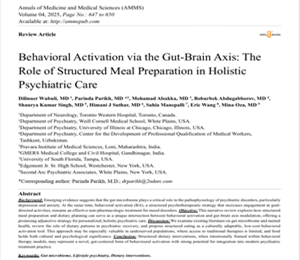Behavioral Activation via the Gut-Brain Axis: The Role of Structured Meal Preparation in Holistic Psychiatric Care
Authors
##plugins.themes.bootstrap3.article.main##
Abstract
Background: Emerging evidence suggests that the gut microbiome plays a critical role in the pathophysiology of psychiatric disorders, particularly depression and anxiety. At the same time, behavioral activation (BA), a structured psychotherapeutic strategy that increases engagement in goal-directed activities, remains an effective non-pharmacologic treatment for mood disorders. Objective: This narrative review explores how structured meal preparation and dietary planning can serve as a unique intersection between behavioral activation and gut-brain axis modulation, offering a promising adjunctive strategy for personalized, holistic psychiatric care. Discussion: We examine existing literature on gut microbiome and mental health, review the role of dietary patterns in psychiatric recovery, and propose structured eating as a culturally adaptable, low-cost behavioral activation tool. This approach may be especially valuable in underserved populations, where access to traditional therapies is limited, and food holds both cultural and psychological significance. Conclusion: Structured dietary interventions, when intentionally framed within behavioral therapy models, may represent a novel, gut-centered form of behavioural activation with strong potential for integration into modern psychiatric treatment practice.
##plugins.themes.bootstrap3.article.details##
Copyright (c) 2025 Dilinuer Wubuli, MD, Parinda Parikh, MD, Mohamad Alsakka, MD, Boburbek Abdugabborov, MD, Shaurya Kumar Singh, MD, Himani J Suthar, MD, Sahia Manepalli, Eric Wang, Mina Oza, MD

This work is licensed under a Creative Commons Attribution 4.0 International License.
Creative Commons License All articles published in Annals of Medicine and Medical Sciences are licensed under a Creative Commons Attribution 4.0 International License.
[1] Blackburn TP. Depressive disorders: Treatment failures and poor prognosis over the last 50 years. Pharmacol Res Perspect. 2019;7(3):e00472. Published 2019 May 3. doi:10.1002/prp2.472 https://pmc.ncbi.nlm.nih.gov/articles/PMC6498411/?utm_source=chatgpt.com
[2] Jacka FN, O’Neil A, Opie R, et al. A randomised controlled trial of dietary improvement for adults with major depression (the “SMILES” trial). BMC Medicine. 2017;15(1):23. doi:10.1186/s12916-017-0791-y. https://bmcmedicine.biomedcentral.com/articles/10.1186/s12916-017-0791-y
[3] Terlizzi EP, Zablotsky B. Symptoms of anxiety and depression among adults: United States, 2019 and 2022.
[4] Cryan JF, O'Riordan KJ, Cowan CSM, et al. The microbiota–gut–brain axis. Physiological Reviews. 2019;99(4):1877-2013. https://journals.physiology.org/doi/full/10.1152/physrev.00018.2018
[5] Foster JA, Neufeld K-AM. Gut–brain axis: how the microbiome influences anxiety and depression. Trends in Neurosciences. 2013;36(5):305-312. doi:10.1016/j.tins.2013.01.005. https://www.sciencedirect.com/science/article/abs/pii/S0166223613000088
[6] Mazzucchelli TG, Kane RT, Rees CS. Behavioral activation treatments for depression: a meta-analysis. Clinical Psychology: Science and Practice. 2009;16(4):383-411. doi:10.1111/j.1468-2850.2009.01178.x https://www.ncbi.nlm.nih.gov/books/NBK76706/
[7] Dobson KS, Hollon SD, Dimidjian S, et al. Randomized trial of behavioral activation, cognitive therapy, and antidepressant medication in the prevention of relapse and recurrence in major depression. J Consult Clin Psychol. 2008;76(3):468-477. doi:10.1037/0022-006X.76.3.468 https://pubmed.ncbi.nlm.nih.gov/18540740/
[8] Merino del Portillo M, Clemente Suárez VJ, Ruisoto P, Jimenez M, Ramos Campo DJ, Beltran Velasco AI, Martínez Guardado I, Rubio Zarapuz A, Navarro Jiménez E, Tornero Aguilera JF. Nutritional modulation of the gut–brain axis: a comprehensive review of dietary interventions in depression and anxiety management. Metabolites. 2024;14(10):549. doi:10.3390/metabo14100549 https://www.mdpi.com/2218-1989/14/10/549?utm_source=chatgpt.com
[9] O’Neil A, Quirk SE, Housden S, et al. Relationship between diet and mental health in children and adolescents: a systematic review. American Journal of Public Health. 2014;104(10):e31-e42. doi:10.2105/AJPH.2014.302110. https://ajph.aphapublications.org/doi/pdf/10.2105/AJPH.2014.302110?utm_source=chatgpt.com
[10] Sampson TR, Mazmanian SK. Control of brain development, function, and behavior by the microbiome. Cell Host Microbe. 2015;17(5):565-576. doi:10.1016/j.chom.2015.04.011 https://pmc.ncbi.nlm.nih.gov/articles/PMC4442490/
[11] Morin A. The importance of keeping a routine during stressful times. Verywell Mind. Published April 3, 2020. Accessed June 26, 2025. https://www.verywellmind.com/the-importance-of-keeping-a-routine-during-stressful-times-4802638
[12] Li TW, Liang L, Ho PL, Yeung ETF, Hobfoll SE, Hou WK. Coping resources mediate the prospective associations between disrupted daily routines and persistent psychiatric symptoms: A population-based cohort study. J Psychiatr Res. 2022;152:260-268. doi:10.1016/j.jpsychires.2022.05.033 https://pmc.ncbi.nlm.nih.gov/articles/PMC9127352/?utm_source=chatgpt.com
[13] Drake RE, Whitley R. Recovery and severe mental illness: description and analysis. Can J Psychiatry. 2014;59(5):236-242. doi:10.1177/070674371405900502 https://pmc.ncbi.nlm.nih.gov/articles/PMC4079142/?utm_source=chatgpt.com
[14] Clarke G, Sandhu KV, Griffin BT, et al. Psychobiotics and the manipulation of bacteria–gut–brain signals. Trends in Neurosciences. 2020;43(11):853-864. doi:10.1016/j.tins.2020.08.006. https://pubmed.ncbi.nlm.nih.gov/27793434/
[15] Ross RE, VanDerwerker CJ, Saladin ME, Gregory CM. The role of exercise in the treatment of depression: biological underpinnings and clinical outcomes. Mol Psychiatry. 2023;28(1):298-328. doi:10.1038/s41380-022-01819-w https://pmc.ncbi.nlm.nih.gov/articles/PMC9969795/?utm_source=chatgpt.com
[16] Firth J, Solmi M, Wootton RE, et al. A meta review of “lifestyle psychiatry”: the role of exercise, smoking, diet and sleep in the prevention and treatment of mental disorders. World Psychiatry. 2020;19(3):360 380. doi:10.1002/wps.20773 https://onlinelibrary.wiley.com/doi/10.1002/wps.20773
[17] Parish AL, Gillis B, Anthamatten A. Pharmacotherapy for Depression and Anxiety in the Primary Care Setting. J Nurse Pract. 2023;19(4):104556. doi:10.1016/j.nurpra.2023.104556 https://pmc.ncbi.nlm.nih.gov/articles/PMC9951804/
[18] Clapp M, Aurora N, Herrera L, Bhatia M, Wilen E, Wakefield S. Gut microbiota's effect on mental health: The gut-brain axis. Clin Pract. 2017;7(4):987. Published 2017 Sep 15. doi:10.4081/cp.2017.987 https://pmc.ncbi.nlm.nih.gov/articles/PMC5641835/?utm_source=chatgpt.com
[19] Balasubramanian R, et al. Fermented foods: Harnessing their potential to modulate the microbiota gut brain axis for mental health. Neurosci Biobehav Rev. 2024; doi:10.1016/j.neubiorev.2024.105562 https://www.sciencedirect.com/science/article/pii/S0149763424000307?utm_source=chatgpt.com
[20] Horn, J., Mayer, D.E., Chen, S. et al. Role of diet and its effects on the gut microbiome in the pathophysiology of mental disorders. Transl Psychiatry 12, 164 (2022). https://doi.org/10.1038/s41398-022-01922-0
[21] Springer Nature Research Intelligence; Ajinomoto Co., Inc. Scientifically supported links between cooking and well-being. Nature Research Intelligence. Published February 2024. Accessed June 26, 2025. https://www.nature.com/articles/d42473-024-00020-7.pdf

